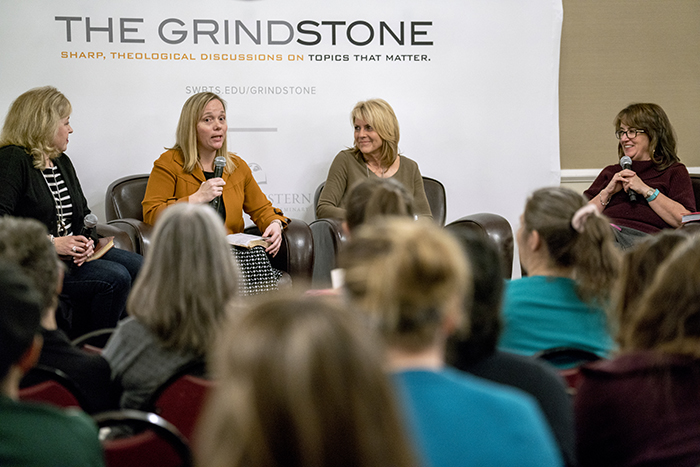Grindstone panelists discuss women’s ministry and cultural issues

During a Grindstone discussion, Feb. 21, three panelists discussed women’s ministry and the numerous cultural issues facing women in the church. In light of such topics, panelist Chris Adams implored women to make the Word of God paramount in addressing any topic a woman in the church might face.
“Our responsibility in the church is to take the women back to where we know there is a standard,” said Adams, senior lead women’s ministry specialist at LifeWay. “There is a truth, and it is for all times and it is for all of us.”
Adams was joined by Kelly King, women’s ministry specialist at LifeWay, and Candi Finch, assistant professor of theology in women’s studies at Southwestern Seminary. As women try to discern through the “cultural noise,” Finch said, women must look to what the Word of God says, but also be women who understand the time and culture in which they live. In order to have an impact on one’s culture, she explained, Christian women must understand what is happening regarding such subjects as feminism and gender and identity roles.
King added that other issues affecting many women are fear, anxiety and depression. “I just hear it over and over again—young women not knowing how to cope and having anxiety attacks and panic attacks,” she said. “So it is important to look at what our culture says versus how do we go to the Word of God and trust Him with our fears?”
Then addressing how Christian women should respond to evolving cultural challenges, panelists discussed how women can guard against a changing culture’s influence on one’s theology and view of God. “It starts with our view of God and knowing that He is unchanging and perfect,” King said. “That needs to be kind of a plumb line in how we view the culture.”
Adams then noted that there must be a shift in how churches disciple women and address difficult topics, for many avoid them altogether. “We have shied away from these questions and issues because we didn’t want to talk about them in the church,” she said. “So women have had to go outside of the church to try to figure these things out. We shouldn’t be surprised that they are listening to culture because they aren’t getting to talk about it in the church.”
Panelists also fielded questions from audience members on various issues including feminist movements, women’s ministry and gender identity. One student posed the question of managing time with the Lord, ministry demands and finding time for rest.
King responded that the key to balancing the demands of ministry is to set boundaries, particularly with regard to prioritizing one’s family. “If I fail my family,” she said, “then my success in ministry is not worth it; they are my first ministry.”
As one attempts to set boundaries in life and ministry, Finch added, it is sometimes necessary to learn how to say “no” to new responsibilities. “Sometimes we think busyness is godliness, and it’s not,” Finch said. “You are just ensuring that you are going to be worn out and weary.
“You ask God to fill your plate and to give you discernment about what you are to say ‘yes’ and ‘no’ to. I am asking by the grace and strength of God that He would help me with that. But I’ve also asked people to keep me accountable.”



